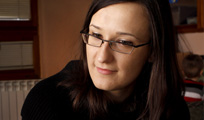Elma Durmisevic
Michael McDonough
Ton Venhoeven
Ahmet Hadrovic
Michael Braungart
Marcel Vroom
Wim Poelman
Rudi Daelmans
Martin Smit
Nirvana Pistoljevic
Natasa Perkovic
Sanja Durmisevic
Miriam Losse
Jan Brouwer
Martin Wollensak
Thomas Bednar
Maarten Dansen
Jaap Wiedenhoff
Adnan Pasic
Ivan Straus
Job Roos
Boran Pikula
Dzenana Bijedic
Haris Hadzialic
Ejub Dzaferovic
Almedina Hadzic
Alisa Grabus
Sanela Klaric
Azra Korjenic
Ken Yeang
Dushko Bogunovich
Michael McDonough
Ton Venhoeven
Ahmet Hadrovic
Michael Braungart
Marcel Vroom
Wim Poelman
Rudi Daelmans
Martin Smit
Nirvana Pistoljevic
Natasa Perkovic
Sanja Durmisevic
Miriam Losse
Jan Brouwer
Martin Wollensak
Thomas Bednar
Maarten Dansen
Jaap Wiedenhoff
Adnan Pasic
Ivan Straus
Job Roos
Boran Pikula
Dzenana Bijedic
Haris Hadzialic
Ejub Dzaferovic
Almedina Hadzic
Alisa Grabus
Sanela Klaric
Azra Korjenic
Ken Yeang
Dushko Bogunovich

Lecture:
Behavioural sciences and environment
17:30h
Day three, Sunday 11 September
Collegium Artisticum
NIRVANA PISTOLJEVIĆ
Nirvana Pistoljević received her Ph.D. in Applied Behavior Analysis from Columbia University Teachers College and worked as the Assistant Director of The Fred S. Keller School, a private research based preschool (non-profit organization), training site for Columbia University graduate students. The Fred S. Keller School serves students ages 18 months through 5 years old with and without developmental delays and implements the Comprehensive Application of Behavior Analysis to Schooling (CABAS®) model of education. The CABAS® model employs behavioral tactics and principles to the measurement and analysis of student learning. She is also an Adjunct Assistant Professor of Education and Psychology in the programs for Teaching as Applied Behavior Analysis in the Department of Health and Behavior Studies at Teachers College. Dr. Pistoljevic has achieved the ranks of Senior Behavior Analyst and Assistant Research Scientist through the CABAS® system and she is a published researcher in the field of education, behavior science, and language development. Her current research interests include early verbal development, such as: Naming (incidental language acquisition capability), increasing spontaneous speech in children with Autism and related developmental delays, acquisition of listener behavior, observational learning and success in inclusion. Also, Dr. Pistoljevic is committed in helping children with Autism and other developmental delays in Bosnia and Herzegovina. This is where she is spending this year contributing to changing educational practices and outcomes for children and their families by helping parents, educators, and other professionals, learn and implement newest evidence based practices in Sarajevo schools. She has spearheaded a Project “CABAS® Mjedenica” starting first classrooms for children with Autism and other developmental delays in Sarajevo, based on Teaching as Applied Behavior Analysis. She is currently training a staff of 30 professionals, providing education for 80 children, lecturing as a visiting professor at University of Sarajevo, Faculty of Pedagogy, conducting research and writing.
Behavioural sciences and environment
Human behavior is largely responsible for the world around us as it is today, so why not study the world through its effect on the humans and vice versa, before we continue to create further? It is necessary to draw upon the evidence-based knowledge of the reciprocal interaction between social groups, individuals and environments in which they exist, and then apply that knowledge in better planning and designing our environments. Behavior analysts believe that consequences from human environment shape human behaviors, and they are interested in studying those interactions of the behavior (i.e. human) and the environment (in the broadest sense). Since, the independent variables of primary importance to behavior analysis are the changes in the environment, through this lecture I will attempt to explain more about the field and its effect on the society today, particularly on urban design and architecture. I will try to focus on the application of the findings from the science of human behavior on the creation and manipulation of the environments to better educational outcomes for children. We know now that the physical, designed environment of early childhood educational settings is related to children’s cognitive, social and emotional development. Derived form this knowledge, I will attempt to provide an example of a design for an outdoor classroom/ play area for children with special needs in Sarajevo, created in collaboration with the Institute for Architecture, Urban Design and Urban Planning. This is a multidisciplinary approach applying knowledge from several sciences and trying to modify our environment to best fit the needs of its users, in this case, a very vulnerable population of children with special needs.
Human behavior is largely responsible for the world around us as it is today, so why not study the world through its effect on the humans and vice versa, before we continue to create further? It is necessary to draw upon the evidence-based knowledge of the reciprocal interaction between social groups, individuals and environments in which they exist, and then apply that knowledge in better planning and designing our environments. Behavior analysts believe that consequences from human environment shape human behaviors, and they are interested in studying those interactions of the behavior (i.e. human) and the environment (in the broadest sense). Since, the independent variables of primary importance to behavior analysis are the changes in the environment, through this lecture I will attempt to explain more about the field and its effect on the society today, particularly on urban design and architecture. I will try to focus on the application of the findings from the science of human behavior on the creation and manipulation of the environments to better educational outcomes for children. We know now that the physical, designed environment of early childhood educational settings is related to children’s cognitive, social and emotional development. Derived form this knowledge, I will attempt to provide an example of a design for an outdoor classroom/ play area for children with special needs in Sarajevo, created in collaboration with the Institute for Architecture, Urban Design and Urban Planning. This is a multidisciplinary approach applying knowledge from several sciences and trying to modify our environment to best fit the needs of its users, in this case, a very vulnerable population of children with special needs.
© 2011 SARAJEVO GREEN DESIGN FESTIVAL
